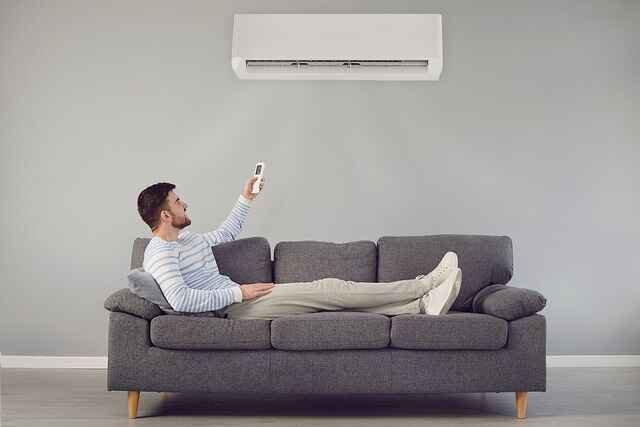Air conditioners have been used for various beneficial reasons everywhere. When the temperature outside increases, these amazing appliances keep you warm inside. Air conditioners have become so prevalent that it’s difficult to understand living without them. While air conditioners give relief from heat and humidity, continuous or excessive use can have negative health consequences and give rise to various health problems.
Ten Potential Health Hazards of Using Air Conditioners:
Dehydration and Dry Skin
Dehydration rates are reported to be higher in air-conditioned rooms. Air conditioners evaporate moisture from the air, causing dry skin, eyes, and mucous membranes. If the air conditioner removes too much humidity from the room and you don’t take care to drink enough fluids, you usually end up dehydrated. This may occur if the temperature is low and you don’t feel warm enough to desire to drink any water.

Respiratory Issues
People inside an enclosed air-conditioned room may have a range of respiratory problems due to the state of air circulation. Air conditioners can spread allergens, dust, and mold spores, causing or aggravating respiratory conditions including allergies or asthma. Additionally, bacteria and fungi can grow in poorly kept units. Because of this, it’s crucial to make sure an air-conditioned space is well-vented. To ensure that everyone within may breathe in the fresh air, there is a consistent flow of fresh air from outside.
Also Read: Asthma: Symptoms, Causes, Prevention, and Treatment
Asthma and Allergies
People who already have allergies and asthma who are in an enclosed air-conditioned room may find that the air conditioning worsens their symptoms. For some persons who are allergic to pollen or other air pollutants, being indoors in an air-conditioned environment can be protective. However, for some people, air conditioning makes their condition worse. This is why it’s crucial to keep the air conditioner clean and well-maintained on a regular basis to reduce the risk of allergies and asthma.
Increased risk of Infections
An air conditioner (AC) works by eliminating moisture from the air, which may cause your nasal passages to dry out and irritate your mucous membranes. The function of mucus in your body is crucial because it functions as a form of barrier to keep harmful bacteria and viruses out of your body. Since viruses and bacteria flourish in low-humidity situations, cold air from air conditioners can increase people’s susceptibility to respiratory infections. This is why it is critical to clean the air conditioning system on a regular basis.
Temperature extremes
Regular changes between harsh outdoor temperatures and chilly inside surroundings can strain the body, resulting in headaches, exhaustion, and, in some cases, heat stroke. When you step in and out of AC rooms or go outside in the heat after being in AC for too long, you might get a headache. You are more prone to have headaches or migraines if you spend time in indoor settings with unclean or poorly maintained HVAC systems.
Muscle Stiffness and Pain
It may seem odd that an air conditioner may make you tired, but it is entirely true. It circulates stale air, and if you are not exposed to fresh air for an extended period of time, you may experience the sensation of becoming easily exhausted. Sitting or sleeping directly under an air conditioner’s cool air can cause muscles to tighten, resulting in discomfort or cramps.

Eye irritation
Constant exposure to the chilly, dry air that air conditioners create can irritate and dry up the eyes. Staying in the air conditioning for an extended period can exacerbate dry eye issues. In severe situations, your eyes might burn. People who have dry eye syndrome should avoid spending too much time in air conditioning.
Skin Problems
For people with sensitive skin, dry air can cause their skin to lose its natural moisture, which can result in dryness, irritation, and even dermatitis. Excessive exposure to AC, combined with sun exposure, can cause dry, itchy skin. Your skin may return to normal after a few hours outside, although dry skin may linger for longer than usual.
Sleep Disturbances
Although technological developments have made modern air conditioners extremely quiet, many individuals continue to use noisy window air conditioners. Older or louder air conditioners in particular might produce noise that disrupts sleep cycles and lowers the quality of sleep.
Also, Read: 10 Breathing Exercises For a Healthy Body & Stress-Free Mind
Increased energy consumption
Air conditioners use a lot of energy, which leads to higher electricity bills and a negative impact on the environment due to increased carbon emissions from power generation. The energy consumption of an air conditioner is determined by various factors, including the air conditioner’s capacity, the efficiency of the air conditioner, the duration of use, the outdoor temperature, and the degree of insulation. Some of these dangers can be reduced by performing routine maintenance, cleaning, and using a humidifier when combined with an air conditioner.
However, it’s crucial to keep in mind that excessive air conditioning use might result in health issues like headaches, dry coughs, nausea, wooziness, difficulty concentrating, exhaustion, and dehydration. It is advised to use air conditioning lightly and keep your home at a suitable temperature.





